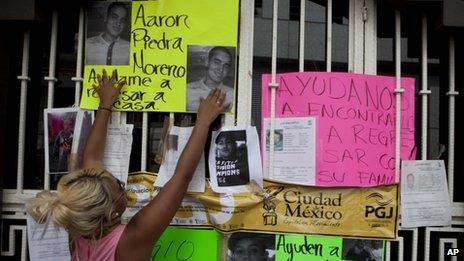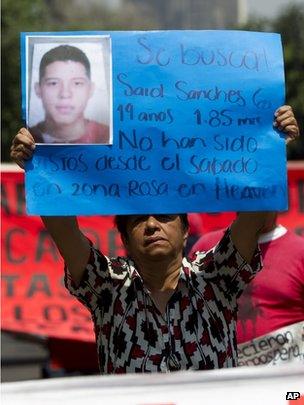Three held over disappearance from Mexico City bar
- Published

Relatives of the youngsters have put up posters where they disappeared
Police in Mexico have detained three people in connection with the disappearance on 26 May of a group of 12 revellers from a bar in Mexico City.
The youngsters' disappearance in broad daylight from a popular entertainment district in a central part of the capital has raised many questions.
Relatives say the police have turned a blind eye to the case because the missing come from a poor area.
Amnesty International says authorities are failing to prevent disappearances.
Inconclusive evidence
Police said they had arrested two waiters, who worked at the Heaven bar in the Zona Rosa district of Mexico City, and a woman, in connection with the 12 missing revellers.
Officers are still looking for the owner of the bar, who they say is now considered a fugitive, after searches of a number of premises he had listed as his addresses turned up nothing.
Mexico City Attorney General Rodolfo Rios said investigators were still analysing video footage from surveillance cameras in the area to establish what exactly happened on the morning of 26 May.
Mr Rios said it showed members of the the group - seven men and five women - arriving at the bar, but not leaving it.
Their disappearance made headlines when their relatives blockaded a street in the Tepito district of Mexico City, demanding that police take action.
The relatives alleged that officers had done nothing after being informed that the group had gone missing.
Investigators said they had interviewed people who were in the area at the time of the disappearance, but said only one man had reported seeing anything suspicious.
According to the man's account, masked gunmen stormed into the Heaven bar at 10:00 on Sunday, seized the group of 12 youngsters and drove away with them in several vehicles.
Officers who tried to question the man further said he had provided a false name, telephone number and address. They have not been able to locate him since.
Investigators said they had not found any trace of a struggle inside the bar.
'Move Heaven and Earth'
Relatives of the missing have accused the authorities of not acting in a timely manner because most of the members of the group reside in Tepito, one of the poorest and most dangerous areas of Mexico City.
Three of the missing are related to Tepito crime bosses currently serving time in prison, which has led to speculation in the media that the group may have been kidnapped by a rival gang.

The families of the missing are demanding the police dedicate more resources to the search
Leticia Ponce said she had delayed telling her jailed husband, Jorge Ortiz Reyes, about the disappearance of their 16-year-old son, Jerzy, in order not to "add to his worries".
Mrs Ponce said that once she did inform Ortiz Reyes, known as The Tank, he had told her "to move Heaven and Earth to find my baby".
Ortiz Reyes' son-in-law is also among the missing, but Mrs Ponce said she did not think their disappearance was linked to her husband's criminal history.
"My husband is paying for his crimes, and my son has nothing to do with that. If they were after him they would have taken just him, and not the other 11," she explained.
While mass kidnappings are not unusual in Mexico, they tend to occur in states where cartels vie for control of drug-smuggling routes, and normally involve members of rival gangs.
A mass kidnapping in the centre of the capital during daylight hours would constitute a major escalation in the violence the city has experienced.
Official figures say 26,000 people have gone missing across Mexico since December 2006, when the army was deployed to fight crime gangs.
On Tuesday, Amnesty International said the Mexican government was not doing enough to investigate the disappearances of thousands of people.
"Disappearances in Mexico have become commonplace because federal and state authorities have tolerated and refused to clamp down on them," the human rights group said in a new report.
- Published4 June 2013
- Published29 January 2013
- Published17 April 2013